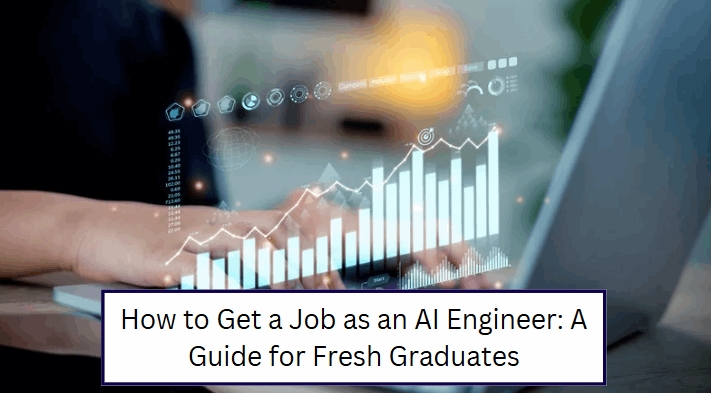According to LinkedIn, AI engineer is the fastest growing role in the US across various industries. AI is everywhere these days, from your social media feed recommendations to self-driving cars. The main brains behind these powerful applications are AI engineers, which makes it one of the most lucrative and exciting careers right now. If you’re thinking of starting a career as an AI engineer or are already a graduate looking for a decent job, this blog post is for you. In it, we’ll walk you through the step-by-step process of getting your first or next job in this competitive landscape. Let’s dive in.
Understand the Role of an AI Engineer
Before you start hunting a role for yourself in a company, it’s important to understand what it entails. An AI engineer is typically responsible for implementing AI models to solve specific problems or automate tasks. The role requires a mix of creativity, mathematics, programming, and problem-solving skills. Your day-to-day responsibilities as an AI engineer may include:
- Designing machine learning algorithms
- Working with datasets
- Deploying AI models
Note that the role is different from that of a data engineer. While both involve large sets of data, an AI engineer builds systems by using that data.
Get the Required Skills
This step involves getting a degree, certification, or course from a reputable organization. Don’t worry if you don’t have all the required skills; build them as you move forward in your career. To become a successful AI engineer, the main skills you need to polish are:
- Programming languages
- Mathematics
- Machine learning
- AI Frameworks
Soft skills include problem-solving and communication. As an engineer, you’ll have to solve real-world problems. Plus, you’ll need strong communication skills to explain technical concepts to non-technical team members.
Get the Required Degree and Certifications
Not all AI jobs require you to have a degree, but having one will make you eligible for almost all of them, improving your chances of success. Companies don’t only look at your degree or certifications; they’re more interested in your ability to help them with your technical skills, which you can showcase with your portfolio. If you want to pursue formal education, get a Bachelor’s degree in a related field, such as computer science or data science. Alternatively, you can take certified professionals’ online courses from platforms like Coursera and Udemy to get ahead of most of the applicants.
You May Also Like: AI Jobs for Beginners (7 Roles to Consider as a Fresh Graduate)
Building a Portfolio for an AI Engineer Job
A strong portfolio helps you tell the prospective employer that you have the right skills and experience for the job. Without it, you don’t have anything to back up your skills. Add recent AI projects to your portfolio. Make sure your portfolio is well-documented and save it on Github for convenient access.
Create a Stand-Out AI Resume
Once you have the skills and portfolio to confidently pursue this career, start applying for AI engineer roles. But before you do that, have a strong resume and cover letter template tailored to AI roles. Here’s what to include in your resume:
- Technical skills and experience
- A list of AI projects you’ve completed in the past
Network in the AI Industry
AI engineer roles are highly rewarding and usually attract many applicants. In addition, applying to jobs on websites like Indeed and LinkedIn, use networking to get noticed as an expert in your field. Start by joining relevant online groups on platforms like Facebook and LinkedIn and join conversations.
Getting Experience as an AI Engineer
Having some experience in relevant roles can help you get high-paying jobs with big companies. The good thing is you don’t need a full-time job to get experience. Try to get your foot in the door by getting an internship, even if it’s an unpaid one. This will help you build the necessary practical skills and create connections in the industry.
Another great way to get some experience is by doing freelance projects. You can offer your AI skills on platforms like Upwork and Fiverr to build your portfolio as well as experience. Lastly, consider doing open-source projects; it’ll help you collaborate with fellow professionals within the industry.
You May Also Like: 7 Entry-Level Jobs to Kickstart Your Career in AI
Where to Find an AI Engineer Job
When you have the right qualifications, skills, and experience, you’re ready to go for a high-paying full-time AI engineer job. Start by creating your profile on job boards like Indeed and LinkedIn and apply for relevant jobs consistently. In addition, find the websites of the companies you want to work with and look out for any job openings. You can also connect with different AI recruiters who act as matchmakers between the right talent and companies. Lastly, the more you make yourself visible in the right communities, the better your chances of attracting potential employers.
How to Get a Job as an AI Engineer: FAQs
Here are some frequently asked questions about how to get a job as an AI engineer.
Is It Hard to Get a Job as an AI Engineer?
When you have the right qualifications, skill set, and experience, there’s nothing that should keep you from getting a decent job as an AI engineer. The key is to keep building your portfolio and consistently apply for job openings.
Are AI Engineers in High Demand?
Yes, AI engineers are in high demand because of the rapid growth of AI applications in many industries, including health, technology, finance, and more.
How to Get an AI Job with No Experience?
Start by working on your programming skills. Take online courses and practice on personal projects. Build your portfolio and network with industry professionals to land your first AI engineer job.
Related: AI Jobs of the Future and the Most Important Skills for AI Professionals
Conclusion
AI engineers have a crucial role in companies working on AI and machine learning projects. Most companies pay top dollar to their employees as it’s a highly brain-intensive job. Getting your first or next AI engineer job shouldn’t take too long if you follow the right path. Once you feel confident about your skills, work on personal or open-source projects. Get an internship for exposure and experience. Then, start applying for relevant positions with a well-organized portfolio. The key to getting a high-paying full-time job is to stay consistent, keep striving for improvement, and network with the right people.


